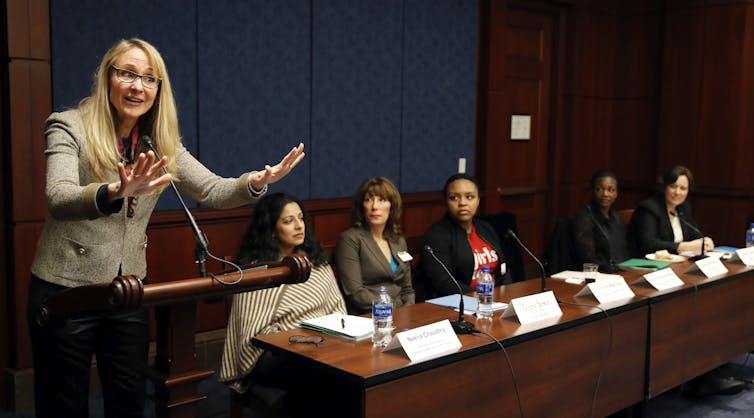Protections against sexual misconduct on campus may end up stifling free speech
- Written by Laurel Leff, Associate Professor of Journalism, Northeastern University
The student journalists we and other university faculty work with tackle difficult issues in our classrooms and for student publications. They write about faculty unionization, racial tensions on campus and university development that encroaches on surrounding communities.
These young reporters, talented and tenacious as they are, often need the guidance of journalism professors.
But because of recent changes in the interpretation of the federal law called Title IX[1], there is one area where we can’t help: stories about campus sexual misconduct.
 Title IX has significantly boosted opportunities for girls and women in athletics, Nancy Hogshead-Makar, three-time Olympic swimming gold medalist, said at a Title IX meeting in 2018.
AP Photo/Alex Brandon[2]
Title IX has significantly boosted opportunities for girls and women in athletics, Nancy Hogshead-Makar, three-time Olympic swimming gold medalist, said at a Title IX meeting in 2018.
AP Photo/Alex Brandon[2]
Reporting requirements
Title IX, passed in 1972, prohibits educational institutions from receiving federal funds if they discriminate on the basis of sex[3]. It applies to roughly 7,000 post-secondary schools across the U.S.
During almost five decades of existence, Title IX has improved conditions for women in academic and athletic programs[4]. Yet recent changes in how schools interpret the law are having unintended consequences that stifle press freedoms[5] and put journalism professors’ jobs at risk[6].
At issue are increasingly common policies that require virtually every university employee[7] to alert school officials if they hear even the slightest rumor of sexual misconduct – on or off campus – involving students or employees.
On most campuses, clergy members, mental health counselors and health care providers are exempt from such mandatory reporting requirements. University-affiliated journalists are not despite the fact that they also often need confidentiality to do their jobs effectively.
Yet, journalism professors routinely learn of possible sexual misconduct in their roles as advisors to student newspapers, or in critiquing students’ classroom work. (It’s also increasingly common for journalism educators to serve as editors in charge of school-sponsored news organizations designed to fill gaps in the local media ecosystem[8].
For instance, a student reporter working on a story about a faculty member accused of sexual misconduct might seek advice on how to protect confidential sources or request public documents.
Students are seldom mandatory reporters under Title IX. But most faculty members are, which forces them to choose between two undesirable options: Tell their students not to share anything about possible sexual misconduct, thus depriving students of guidance on the most sensitive stories they encounter. Or compromise their students’ journalistic independence by telling school officials that such a story is being pursued.
University officials should, of course, be able to comment on any stories involving the institution. But alerting them too early in the reporting process could scare off potential whistleblowers.
Possible penalties
This choice forced on journalism advisers hampers more than journalism students and faculty. It also hurts educational institutions and the cause of protecting victims.
Institutions, from the military[9] to corporations[10] to universities[11], fail survivors of sexual assault and harassment all the time. They ignore, minimize and even cover up incidents of sexual misconduct.
It often takes journalists, relying on confidential tips from vulnerable parties, to uncover the truth.
 Journalist Ronan Farrow won a Pulitzer Prize in 2018 for his work uncovering sexual misconduct by Hollywood mogul Harvey Weinstein.
Fuzheado/Wikimedia Commons, CC BY-SA[12][13]
Journalist Ronan Farrow won a Pulitzer Prize in 2018 for his work uncovering sexual misconduct by Hollywood mogul Harvey Weinstein.
Fuzheado/Wikimedia Commons, CC BY-SA[12][13]
We’ve seen this play out in recent years as many of the best-known sexual misconduct stories relied on sources that demanded anonymity. The New York Times[14] and New Yorker[15] investigations into serial sexual predator Harvey Weinstein, the Indianapolis Star’s revelations[16] about Michigan State University team physician Larry Nassar’s child sexual abuse[17] and many similar stories helped fuel the #MeToo movement.
The current interpretation of Title IX makes this already difficult journalistic work even harder, and the consequences aren’t just hypothetical.
 Journalism professor Dan Malone.
Tarleton State University[18]
Journalism professor Dan Malone.
Tarleton State University[18]
Last year administrators at Tarleton State University in Stephenville, Texas, reprimanded[19] journalism professor Dan Malone for failing to comply with a Title IX mandatory reporting policy.
Malone’s troubles started after the student-staffed Texan News Service[20], which he advises, published a story about a professor’s alleged sexual misconduct that relied partly on anonymous sources.
The school threatened to fire Malone[21], a Pulitzer Prize winner who used to work at the Dallas Morning News, for not disclosing the confidential tips to administrators before the article was published.
Malone kept his job, but could face termination if the university feels he violates its policies again.
Reining in local NPR
Title IX’s reporting requirements have also impinged upon professional news organizations.
Roughly two-thirds[22] of NPR’s member newsrooms have some kind of university affiliation and thus may be subject to Title IX.
NPR Illinois reporters discovered this when they probed sexual harassment allegations at the University of Illinois at Urbana-Champagne.
A reporter for the Springfield-based station joined with ProPublica, a non-profit investigative journalism organization, to publish stories documenting that the university had gone easy on several professors found to have violated university sexual misconduct policies[23].
A few days after the stories appeared, the University of Illinois-Springfield informed the station’s general manager[24] that because the state university system held the station’s broadcast license, NPR staffers were university employees who had to follow university policies.
That included the policy requiring them to “report in detail all incidents of sexual violence, sexual harassment, or other sexual misconduct.”
In other words, any tips NPR Illinois and ProPublica received about harassment in the University of Illinois System (not at other Illinois colleges) had to be turned over to the university. ProPublica handled these tips but not every NPR station has such a partner.
NPR Illinois asked the university to reconsider its policy. The university refused, saying the station’s journalists “remain free to pursue information about the topic at issue but should avoid promising confidentiality to anyone about allegations of sexual misconduct.”[25]
A number of organizations, including the Reporters Committee for Freedom of the Press and the ACLU of Illinois, have written letters and issued statements[26] in support of NPR Illinois.
The station took its case[27] to the university’s board of trustees. They asked that journalists be exempted from Title IX mandatory reporting requirements.
The board has yet to take action on the request but issued a written statement[28]. Exempting journalists, they wrote, would jeopardize “the safety of our campuses, our students, and our faculty and staff.”
 The University of Illinois System Board of Trustees has been asked to consider a Title IX exemption for journalists.
University of Illinois System[29]
The University of Illinois System Board of Trustees has been asked to consider a Title IX exemption for journalists.
University of Illinois System[29]
Exempting journalists
The situation in Illinois is a stark example of how overly broad interpretations of Title IX are stifling press freedoms[30].
It also points to the need for institutional policies or state laws exempting university-affiliated journalists and journalism educators from mandatory reporting requirements when they are advising student journalists. Journalism faculty who learn of misconduct outside their roles as advisers or editors should report it under Title IX. But if student journalists can’t count on confidentiality as they develop these stories, sources might not come forward at all and serious misconduct may never be revealed.
These kinds of protections are even more critical in the many media markets where student-staffed news organization[31] or public radio stations affiliated with universities are the only media holding local institutions, including universities, accountable.
Title IX was designed to make higher education more inclusive and equitable. But, as the University of Illinois expose suggests, it can be hard to tell if universities are using the law to protect the powerful or to help their victims.
Independent, watchdog journalism is one tool that can point out the difference.
[ Deep knowledge, daily. Sign up for The Conversation’s newsletter[32]. ]
References
- ^ Title IX (www2.ed.gov)
- ^ AP Photo/Alex Brandon (www.apimages.com)
- ^ discriminate on the basis of sex (www2.ed.gov)
- ^ improved conditions for women in academic and athletic programs (www.aauw.org)
- ^ that stifle press freedoms (splc.org)
- ^ jobs at risk (www.poynter.org)
- ^ require virtually every university employee (www.chronicle.com)
- ^ school-sponsored news organizations designed to fill gaps in the local media ecosystem (ijoc.org)
- ^ military (www.usnews.com)
- ^ corporations (hbr.org)
- ^ universities (www.aaup.org)
- ^ Fuzheado/Wikimedia Commons (commons.wikimedia.org)
- ^ CC BY-SA (creativecommons.org)
- ^ The New York Times (www.nytimes.com)
- ^ New Yorker (www.newyorker.com)
- ^ Indianapolis Star’s revelations (www.indystar.com)
- ^ Larry Nassar’s child sexual abuse (www.nytimes.com)
- ^ Tarleton State University (www.tarleton.edu)
- ^ reprimanded (texasmonitor.org)
- ^ Texan News Service (texannews.net)
- ^ threatened to fire Malone (texasmonitor.org)
- ^ Roughly two-thirds (www.npr.org)
- ^ violated university sexual misconduct policies (www.propublica.org)
- ^ informed the station’s general manager (www.propublica.org)
- ^ allegations of sexual misconduct.” (www.nprillinois.org)
- ^ have written letters and issued statements (www.rcfp.org)
- ^ took its case (current.org)
- ^ a written statement (news.uillinois.edu)
- ^ University of Illinois System (www.bot.uillinois.edu)
- ^ how overly broad interpretations of Title IX are stifling press freedoms (splc.org)
- ^ student-staffed news organization (www.nytimes.com)
- ^ Sign up for The Conversation’s newsletter (theconversation.com)
Authors: Laurel Leff, Associate Professor of Journalism, Northeastern University

